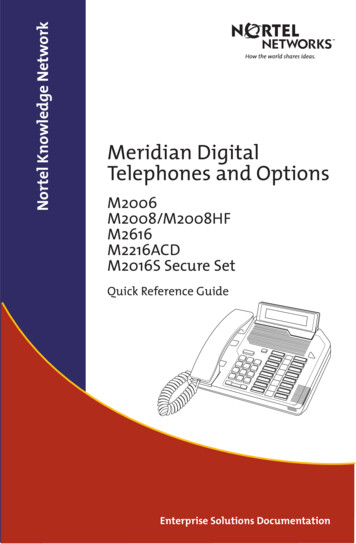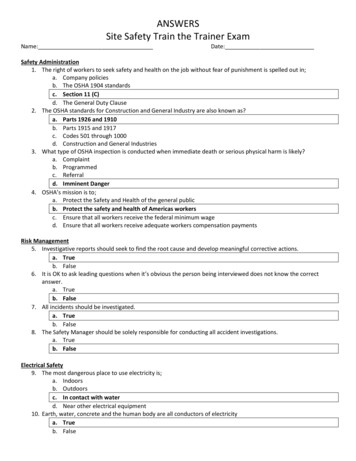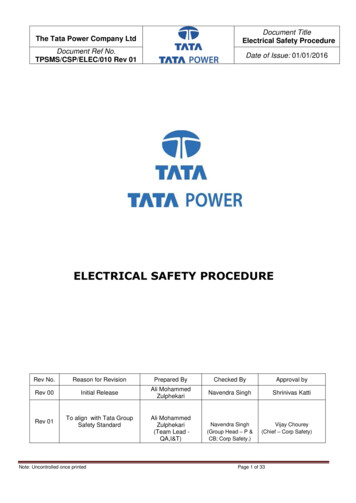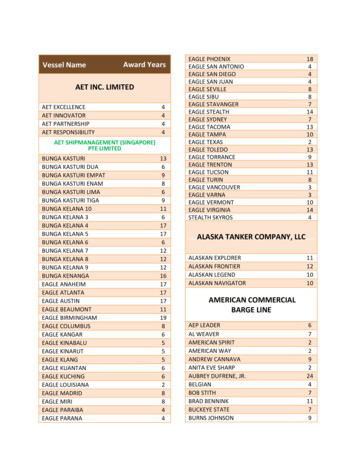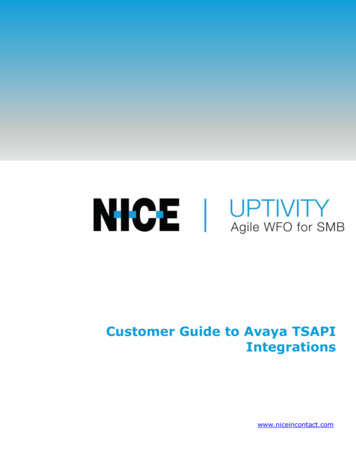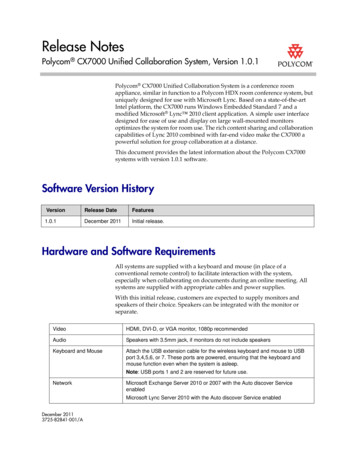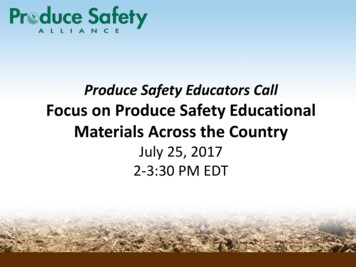
Transcription
Produce Safety Educators CallFocus on Produce Safety EducationalMaterials Across the CountryJuly 25, 20172-3:30 PM EDT
Instructions All participants are muted. There will be time for questions and answers at themid-point and end of the meeting. Only thoseconnected online will be able to ask questions.– To ask a question or make a comment, please ‘raise your hand’– We may not get around to all comments/questions, BUT youmay leave additional comments in the comment box to becompiled after the session This session will be recorded and notes will be sharedvia the listserve and on our website after the call.2
Agenda 2:00 PM 2:15 PM 2:25 PM 2:35 PM 2:45 PM2:55 PM 3:05 PM 3:15 PM 3:25 PMProduce Safety Alliance Educational MaterialsPresenter: Betsy Bihn/Gretchen WallNortheast Center to Advance Food Safety (NECAFS)Presenter: Elizabeth NewboldSouthern Center for Training, Education, Extension, Outreach, andTechnical Assistance to Enhance Food SafetyPresenter: Jessica LepperNorth Central Region Center for FSMA Training, Extension, andTechnical AssistancePresenter: Angela ShawMid-way Questions on PSA, NE, SC, NC materialsWestern Center for Training, Education, Extension, Outreach, andTechnical Assistance Center to Enhance Food SafetyPresenter: Jovana KovacevicIndigenous Food and Agriculture InitiativePresenter: TBDLocal Food Safety CollaborativePresenter: Barbara PattersonFinal questions, comments, and other educational needs
Educational MaterialsAvailable & In Development
PSA Curriculum DevelopmentJune 2011 - May 2012Working CommitteesEducational Materials Conf.March - June 2012Farmer Focus GroupsJuly - December 2012Jan 2013 - July 2016
PSA Curriculum Materials PSA Curricula (English & Spanish)– Grower Training Course– Train-the-Trainer Course Supporting Materials–––––FSMA Produce Safety Rule Regulatory TableFood safety plan writing resourcesLearning objectives and critical conceptsFDA, USDA-AMS, & USDA-NRCS fact sheetsGlossary The PSA Grower Training Course is one way to satisfy the FSMA Produce SafetyRule requirement outlined in § 112.22(c)6
Supplemental Resources Available rces/generalresource-listing Agricultural Water– GM, STV, and Microbial Die-off Rates– The Water Analysis Method Requirement in the FSMA PSR– FSMA PSR Water Requirements: Insights to get you organized! Recordkeeping– Records Required by the FSMA PSR – plus template records Sanitation– Labeled Sanitizers for Produce – Excel Tool, plus video tutorial7
Trainer Specific Resources Available at: /trainerresources Course Logistics–––––How to register a PSA Grower Training with AFDOAgenda templatesTraining course set up guideTemplate language for advertisingHow to order materials Exemptions/Exclusions– FSMA PSR Exemptions & Exclusions PPT, including scenarios Just for Fun– Produce Safety Bingo8
Supplemental Resources: In Progress! Available rces/generalresource-listing Sanitation– “Name that Zone” activity, includes photos to help prioritize and identifyZones 1-4 in produce packinghouses Online– PSA Grower Training Course, will meet requirements outlined in 112.22(c)– Instructor led, includes activities and opportunities for engagement– Anticipated launch: Winter 20189
Future Educational Materials &Potential Collaboration Ideas Develop new materials or modify to satisfy changing needs andfor technical assistance– e.g., more on postharvest sanitation, sanitary design, small/very smallfarm food safety solutions, resources for produce buyers, new science Adapt or add on to materials for specific audiences– Small, organic, underserved, or diversified growers– Culturally appropriate International training efforts– Produce International Partnership (PIP) – working with JIFSAN & FDA toidentify training needs and materials10
NECAFSChris CallahanProject Lead - UVM Extensionchris.callahan@uvm.eduElizabeth NewboldCenter Admin - UVM nsion/necafs
Food Safety for Food Workers - Basic food safety instructional materialsRita Brennan Olson, Massachusetts Partnership for Food Safety Education,ritabo@nutrition.umass.eduDescription of Material:- Easy to read posters, pamphlets and other print materials on basic food safetyprinciples- Available in multiple languagesPresentation Type:Can supplement training or given out individuallyStatus:Completed and available w.mafoodsafetyeducation.info/fs workplace.html
Food Safety Training, Food Safety Checklist, Produce Safety Rule PlainLanguage Guide, Food Safety PresentationMolly DellaRoman, New Entry Sustainable Farming Project, molly.dellaroman@tufts.eduCollaborators: Lisa McKeag, UMass, lmckeag@umext.umass.edu; Billy Mitchell, GlobalGrowers, billy@globalgrowers.orgDescription of Material:- Development of Produce Safety Rule presentation, farmer checklist, SOP’s, PlainLanguage Guide and signage- Focus on farms that are exemptPresentation Type:Supplemental material for trainingsStatus:In Development and seeking feedback. When completed, will be posted at:https://nesfp.org/
Wash Your ProduceShauna Henley, University of Maryland Extension, Baltimore County,shenley@umd.eduCollaborator: Maryland Department of AgricultureDeanna.baldwin@maryland.govDescription of Material:- Signage on how to wash fresh produce- Including the HOWs and WhysPresentation Type:Supplemental material for trainings or given out individuallyStatus:Completed.PDF and/or PowerPoints can be shared.
Water CalculationsHeather Bryant, University of New Hampshire Cooperative Extension,heather.bryant@unh.eduDescription of Material:- PowerPoint presentation- Features discussion of microbial water quality profile calculators available onlinePresentation Type:Given as part of a two-day grower trainingStatus:Completed.
Produce Safety: Best Practices from Field to ConsumerKyla Bedard, NOFA-VT, kyla@nofavt.orgCollaborator: Hans Estrin, hans.estrin@uvm.edu, UVM ExtensionDescription of Material:- On farm workshop: tour discussing the pieces of a successfully accredited farm- Discussion of Community Accreditation for Produce Safety (CAPS) Vermont’s stateaccreditation program- Focus on small to medium sized farmsPresentation Type:Stand along programStatus:Currently in development with first workshop to be held August 7th. More practices-field-consumer
Resource ClearinghouseNECAFS, necafs@uvm.eduDescription of Material:- Central location for food safety resources- Including additional educational materialPresentation Type:Open to the public websiteStatus:Currently in development, once active website will se
Southern Center forFSMA Training –“Add-on” EducationalMaterialsJESSICA LEPPERJULY 25 TH , 2017USDA NIFA AWARD NUMBER 2015-70020-24397
Project Objectives1. Develop a cadre of PSA and FSPCA certified trainers within theSouthern US who are focused on supporting the produceindustry.2. Develop and deliver region and stakeholder specificeducation, training curricula, and technical assistanceprograms.3. Create strong partnerships with representative nongovernmental organizations/community-based organizationsto build capacity and strengthen collaboration for FSMAcompliant trainings.4. Evaluate the impact of Southern Center education, training,and technical assistance programs.USDA NIFA AWARD NUMBER 2015-70020-24397
Overall VisionSouthern CenterTrain-the-TrainerWorkshopsSupplementalFSMA CurriculaCoordinationCadre ofCertified Trainers, CertifiedLead Trainers, andLead alAssistanceEvaluationUSDA NIFA AWARD NUMBER 2015-70020-24397
Terms We are Using in OurObjective 2 ActivitiesAdd-ons Workshops, materials, and specific products that will enhanceunderstanding among our stakeholders regarding the standardizedcurricula Example: water workshop (supporting water component)Modules – now Teaching Examples Especially for the FSPCA training, unofficial examples that can beused for breakout exercises with specific audiences Example: tomatoesUSDA NIFA AWARD NUMBER 2015-70020-24397
Development of Add-ons inthe SCY1 – Brainstorming at kick-off meeting - January 2016 What region-specific supplements to the core curricula do we need?Groupers vs. splittersConsider target audienceConsider different formatsDevelop learning objectivesY2 – Updates, further development, review – January 2017Y3 – Rollout – January 2018USDA NIFA AWARD NUMBER 2015-70020-24397
Add-ons in the SCProduce Safety Rule Add-onsPreventive Controls Rule Add-ons Biohazards Beginner’s Guide Exemptions Advanced Guide Preharvest Water Compliance and Exemptions Postharvest Water Food Safety Plan SanitationUSDA NIFA AWARD NUMBER 2015-70020-24397
PSR ExemptionsTeamLeads: Roland McReynolds, Diane Ducharme, KristinWoods, Laura StrawnGroup: Amy Simonne, Annette Wszelaki, Chip Simmons,Anand Mohan, Achyut Adhikari, Katheryn Fontenot, PowellSmith, Paul Vijaykumar, Adrianna VargoUSDA NIFA AWARD NUMBER 2015-70020-24397
PSR ExemptionsBrainstorming Help growers decide coverage or exemption? What rules? How to prove an exemption? Format: Q&A GuideUSDA NIFA AWARD NUMBER 2015-70020-24397
PSR ExemptionsLearning Objectives Define farm (all types) and identify activities allowed during harvesting,packing, holding, storing, and distributing of produce. Determine whether an operation may qualify as a retail food establishment. List produce that is covered and not covered under the Produce Safety Rule. Identify farms that are exempt from the Produce Safety Rule. Define a qualified exemption, and identify farms that qualify for thisexemption. Identify records or documents to verify and retain exempt or qualified exemptstatus. Explain the key cornerstones (basic standards) of the Produce Safety Rule. List compliance dates for the Produce Safety Rule.USDA NIFA AWARD NUMBER 2015-70020-24397
PSR ExemptionsNext Steps Flow and formatting – 18 page document App? Next steps: reviewUSDA NIFA AWARD NUMBER 2015-70020-24397
Commodity Specific TeachingExamples Aggregator/multi-commodity Microgreens Apples Pecan shelling Dry-packed blueberries Peppers Wet-packed blueberries Shelled peas Broccoli Squash Bulb onions Strawberries Cantaloupe Sweet corn Collards Sweet potatoes Cucumbers Grape tomatoes Grapefruit Mature green tomatoes Green beans Dry-packed watermelon Herbs Wet-packed watermelonUSDA NIFA AWARD NUMBER 2015-70020-24397
EvaluationLogic Models for FSPCA and PSA TrainingsAttendance Questionnaire (includes perceived barriers toFSMA implementation)Pre/Post test for FSPCA and PSA Trainings From a sample size of 557, participants had a mean pre-test score of16.9, and a mean post-test score of 21.1 (out of 25). Results showed post-test scores were statistically significantly higherthan pre-test scores (T 31.64, p 0.001), indicating a significantincrease in knowledge after participation in PSA trainings.Three month follow up interviewsUSDA NIFA AWARD NUMBER 2015-70020-24397
Questions?USDA NIFA AWARD NUMBER 2015-70020-24397
North CentralRegional Centerfor FSMADr. Angela Shaw, Project Director &Assistant Professor, Iowa State University
The North Central Regional (NCR) Centerfor FSMA Training, Extension, andTechnical Assistance U.S. Food and Drug Administration (FDA) to represent the 12 states inthe Midwest region of the United States (Iowa, Illinois, Indiana, Kansas,Michigan, Minnesota, Missouri, Nebraska, North Dakota, South Dakota,Ohio, and Wisconsin). Purpose is to establish a network of educators and produce growersand processors to assist with conducting a regional needs assessmentand identifying gaps in knowledge related to the FSMA Produce SafetyRule and Preventive Control Rules. It will develop and implement a food safety program that addresses theneeds of small-scale growers/processors and educators in the NorthCentral Region.
Four major objectives1. Establish a sustainablecommunication network ofeducators and grower/processorsin NCR to facilitate collaborationand build training capacity2. Conduct a regional needsassessment and identify gaps inknowledge and educationaltools/technical assistance needs
Four major objectives, cont.3. Develop and implement a food safetyprogram that addresses theseregional specific needs of small-sizedgrowers/processors and educators.4. Use continuous evaluation to improvetraining and other services.
ACCOMPLISHED THROUGHJUNE 2017
Establishment of SustainableCommunication Network Public website and internal website interfacePartnership with all 12 statesDatabase reach over 2,000 growersBi monthly virtual recorded meetings, monthlynewsletter, and listening sessions Two journal articles submitted– JOE: Needs Assessment as a Tool– Food Protection Trends: Results of NeedsAssessment
Conduct Needs Assessmentwith Growers Two Rounds using modified Delphi approach Electronic and Paper Form The survey included– Content (rank order of top needs round two)– Methods delivery (rating scale preferences)– Demographic (multiple choice; open ended) 600 useable surveys from both rounds Utilize results for Add-On Development
Conduct Needs Assessmentwith Processors and Educators Processor Needs Assessment developed June2017 and currently under review Developed a audit checklist for processors offruits and vegetables based on the PreventiveControl Human Food Rule.
Increasing the Knowledge andCapacity of Educators Survey for educators to identify resources toassist with preparation for grower trainings PSA Courses Held– Train-the-trainer: 4– Grower training: 39 Establish a network of lead trainers:– PSA Lead Trainers: 25– PSA Trainers: 139
Evaluation of NCR Food Safety Programfor Growers and Processors Post-training survey for Food Safety PreventiveControl Alliance (FSPCA) courses. An electronic follow-up survey to send to fruitand/or vegetable processors 12 months. Survey for field days and workshops. Conducted interviews with the State Leads andExtension Partners to determine how to improveNCR FSMA group.
Dissemination of North CentralRegion Food Safety Program Travel between states and regional centers Branding and packaging NCR Program:– A mailing and email list– A Facebook page(https://www.facebook.com/NCRFSMA/)– A logo for the North Central Regional Center– A display stand for conferences and eventshave been created
Develop NCR Food SafetyProgram Subgroups formed based needs assessmentfindings Tasked to develop Add-On materials based onidentified topics variety of formats Job description provided Existing resources located in Box folder for review
Timeline Group meeting and plan of action developedend of July Complete final draft by October FDA courtesy review Subgroup reviews by December Finalized by January 2018
Identified Topics (15)– FSMA-based on farm training guide forvolunteers and workers– U-Pick and Farm Stands Guidance– Biological soil amendments– Wildlife Management and DomesticatedAnimal Management– Bodily fluid clean-up– Record keeping– Organic versus Produce Safety Rule
Subgroup Topics, continued– Amish and Hmong Educational Approach– Value Added Industry: Wine and Hops GuidanceFreezing and Dehydration of ProduceJam and JellyPickles and Relish
Future Plans, continue Conduct fruit and vegetable processor needsassessment Update FSPCA Animal Rule Checklist Support Individual States– More Train-the-Trainer Courses (2 comingsoon)– Provide PSA Grower Trainers throughoutregion– Funding opportunities for lead trainers andgrower courses
Questions Angela Shaw, Linda Naeve, CatherineStrohbehn, Ellen Johnsen ncrfsma@iastate.edu 515-294-0868 Visit our website: https://ncrfsma.org/ Follow us on Facebook: NCR FSMATraining, Extension, and TechnicalAssistance
5 minutesQuestions about PSA, NECAFS,Southern Center, or North CentralRegional Center Materials
Western Regional CenterAdd-on ProjectsPSA Educator’s CallJuly 25, 2017Jovana Kovacevic, PhDWRCEFS Coordinator, co-PIjovana.kovacevic@oregonstate.edu
Add-on projects brainstorming Annualmeeting– March 2017,Honolulu HI– 52 attendees
Internal project proposal call Meeting minutes andtemplates for add-onproject proposals wereshared with meetingattendees– Due by May 31, 2017– Review in June, 2017– Notifications in July, 2017
Submitted proposalsProject topic1. Sanitation and environmental monitoring basics2. Flow chart for on farm value added processing3. Aquaponics and intensive containerized hydroponics: Monitoring and recordkeeping training4. Development of digital repository for food safety training photos5. Food safety education for the cottage industry and farmer’s market groups6. Small farm agricultural water monitoring and treatment multilingual trainingvideos7. Introduction to FSMA and basic food safety and preventive controls educationfor small and very small scale food processors (”Pre-PCQI introductory seminarseries”)8. Food safety plan for breadfruit flour
Submitted proposalsProject topic1. Sanitation and environmental monitoring basics2. Flow chart for on farm value added processing3. Aquaponics and intensive containerized hydroponics: Monitoring and recordkeeping training4. Development of digital repository for food safety training photos5. Food safety education for the cottage industry and farmer’s market groups6. Small farm agricultural water monitoring and treatment multilingual trainingvideos7. Introduction to FSMA and basic food safety and preventive controls educationfor small and very small scale food processors (”Pre-PCQI introductory seminarseries”)8. Food safety plan for breadfruit flour
1. Sanitation and environmental monitoring basicsDeWitt et al. Objective– To develop educational and training materials for a handson workshop designed to provide the essentials ofcleaning and sanitation in food handling, processing andmanufacturing facilities. Hazards and strategies to control them Environmental monitoring Sanitation in the processing facility- Sanitary equipment and facility design- Cleaners and sanitizers and their mode of action- Strategies for pest control- Strategies for allergen control
1. Sanitation and environmental monitoring basicsDeWitt et al.
Submitted proposalsProject topic1. Sanitation and environmental monitoring basics2. Flow chart for on farm value added processing3. Aquaponics and intensive containerized hydroponics: Monitoring and recordkeeping training4. Development of digital repository for food safety training photos5. Food safety education for the cottage industry and farmer’s market groups6. Small farm agricultural water monitoring and treatment multilingual trainingvideos7. Introduction to FSMA and basic food safety and preventive controls educationfor small and very small scale food processors (”Pre-PCQI introductory seminarseries”)8. Food safety plan for breadfruit flour
2. Flowcharts for on-farm value added processingDiCaprio and Feiereisel Objective– To develop a series of flow charts that will aid the farmerin determining what state and federal regulation apply totheir operation.These flowcharts will be distinct from those already availablefrom the National Sustainable Agriculture Coalition. Will include the addition of state regulations that may alsoapply to the value-added products in addition to FSMA. Initial will be based on California state regulations, andthese flowcharts can then be modified to reflect theregulations in other western states.
2. Flowcharts for on-farm value added processingDiCaprio and Feiereisel
Submitted proposalsProject topic1. Sanitation and environmental monitoring basics2. Flow chart for on farm value added processing3. Aquaponics and intensive containerized hydroponics: Monitoring and recordkeeping training4. Development of digital repository for food safety training photos5. Food safety education for the cottage industry and farmer’s market groups6. Small farm agricultural water monitoring and treatment multilingual trainingvideos7. Introduction to FSMA and basic food safety and preventive controls educationfor small and very small scale food processors (”Pre-PCQI introductory seminarseries”)8. Food safety plan for breadfruit flour
3. Aquaponics and intensive containerized hydroponics:Monitoring and record-keeping training ObjectiveRasco et al.– Overall objective is the development of educationalmaterials for aquaponic producers to improve their foodsafety plans, monitoring and recordkeeping systems.1.2.3.4.5.Specific objectives include:Evaluate current literature and conduct a risk assessment.Develop a model model food safety plan and GAP for aquaponic products.Develop a strategy for monitoring and recordkeeping for aquaponicproducers.Provide suggestions for validation and verification for select model systems.Develop training materials and provide a one-day workshop that would berecorded and available as a webinar.
3. Aquaponics and intensive containerized hydroponics:Monitoring and record-keeping trainingRasco et al.
Submitted proposalsProject topic1. Sanitation and environmental monitoring basics2. Flow chart for on farm value added processing3. Aquaponics and intensive containerized hydroponics: Monitoring and recordkeeping training4. Development of digital repository for food safety training photos5. Food safety education for the cottage industry and farmer’s market groups6. Small farm agricultural water monitoring and treatment multilingual trainingvideos7. Introduction to FSMA and basic food safety and preventive controls educationfor small and very small scale food processors (”Pre-PCQI introductory seminarseries”)8. Food safety plan for breadfruit flour
4. Digital repository for food safety training photosSuslow et al. Objective– To create a digital repository of photos that illustrate FSMAfood safety standards and best practices. Photos will serveas a free, long-term, and easily accessible source ofexamples and clarification to fill learning gaps and enhanceclassroom-based certification trainings.
4. Digital repository for food safety training photosSuslow et al.
Submitted proposalsProject topic1. Sanitation and environmental monitoring basics2. Flow chart for on farm value added processing3. Aquaponics and intensive containerized hydroponics: Monitoring and recordkeeping training4. Development of digital repository for food safety training photos5. Food safety education for the cottage industry and farmer’s market groups6. Small farm agricultural water monitoring and treatment multilingual trainingvideos7. Introduction to FSMA and basic food safety and preventive controls educationfor small and very small scale food processors (”Pre-PCQI introductory seminarseries”)8. Food safety plan for breadfruit flour
5. Food safety education for the cottage industry andfarmer’s market groupsWages et al. Objectives– Identify and address the food safety risks and hazards for verysmall producers from the cottage industry and farmer’s marketgroups. Topics addressed will include: Produce safety, safe food handling, labeling, permitting rules (specificto locale), sanitary design– Develop and create educational videos to address morecomplex issues, and develop posters and pictographics foraddressing less complex topics.– Create a YouTube channel to upload videos for ease of crossposting on each participating member’s institutional websites(e.g. University of Hawaii’s Food Safety Website).
5. Food safety education for the cottage industry andfarmer’s market groupsWages et al.
Submitted proposalsProject topic1. Sanitation and environmental monitoring basics2. Flow chart for on farm value added processing3. Aquaponics and intensive containerized hydroponics: Monitoring and recordkeeping training4. Development of digital repository for food safety training photos5. Food safety education for the cottage industry and farmer’s market groups6. Small farm agricultural water monitoring and treatment multilingual trainingvideos7. Introduction to FSMA and basic food safety and preventive controls educationfor small and very small scale food processors (”Pre-PCQI introductory seminarseries”)8. Food safety plan for breadfruit flour
6. Small farm agricultural water monitoring andtreatment multilingual training videosWong et al. Objectives– Identify available water treatment options in Hawaii, Guam and AmericanSamoa.– Develop a protocol for testing and treating agricultural water. Based on water testing and treatment protocol, develop a story board for videoproduction. Translate story board into Vietnamese, Thai, Lao, Chinese (Mandarin), Tagalog, andIlocano. Tape audio recording in various languages. Add close caption for each ofthe languages with assistance from translator as needed. Video tape water testing and treatment process, edit and create final video. Upload video to CTAHR Farm Food Safety, Hawaii Department of Agriculture,University of Guam and American Samoa Community College websites.
6. Small farm agricultural water monitoring andtreatment multilingual training videosWages et al.
Submitted proposalsProject topic1. Sanitation and environmental monitoring basics2. Flow chart for on farm value added processing3. Aquaponics and intensive containerized hydroponics: Monitoring and recordkeeping training4. Development of digital repository for food safety training photos5. Food safety education for the cottage industry and farmer’s market groups6. Small farm agricultural water monitoring and treatment multilingual trainingvideos7. Introduction to FSMA and basic food safety and preventive controls educationfor small and very small scale food processors (”Pre-PCQI introductory seminarseries”)8. Food safety plan for breadfruit flour
7. Pre-PCQI FSMA Introduction Short SeminarsKovacevic et al. Objective– Developing educational and training materials for a seriesof short seminars that are designed to provide the basicfood safety knowledge in line with the Food SafetyModernization Act (FSMA) requirements.Simplified for an audience that may not be familiar with foodsafety and FSMA, or ready for the level of training offeredthrough the standardized Food Safety Preventive ControlsAlliance (FSPCA) curriculum for Preventive Controls QualifiedIndividuals (PCQI).
7. Pre-PCQI FSMA Introduction Short Seminars Format: Two-hour courses (taken individually or collectively)Food Safety BasicsSanitation Requirements and Procedures toComply with the cGMPsIntroduction to FSMA 101Elements of Writing a Food Safety Plan - SmallBusinessOverview of Preventive Controls for HumanFoods RuleElements of Writing a Food Safety Plan - Verysmall businessOverview of Produce Safety RuleModified Requirements for Very Small QualifiedFacilitiesCurrent Good Manufacturing Practices (cGMPs) Seminars overview will be available as a free webinar; more specific seminars will be offered through OSUFood Innovation Center’s Food Safety Program ( 110/course) Timelines:–Teaching materials development: August - September, 2017–Review: September - October, 2017–Pilot: October, 2017 – May, 2018
7. Pre-PCQI FSMA Introduction Short SeminarsKovacevic et al.
Submitted proposalsProject topic1. Sanitation and environmental monitoring basics2. Flow chart for on farm value added processing3. Aquaponics and intensive containerized hydroponics: Monitoring and recordkeeping training4. Development of digital repository for food safety training photos5. Food safety education for the cottage industry and farmer’s market groups6. Small farm agricultural water monitoring and treatment multilingual trainingvideos7. Introduction to FSMA and basic food safety and preventive controls educationfor small and very small scale food processors (”Pre-PCQI introductory seminarseries”)8. Food safety plan for breadfruit flour
8. Food Safety Plan for Breadfruit FlourYang et al. Objective– Develop a model food safety plan for processing safe andwholesome tropical fruit product, using breadfruit as anexample.The Model Food Safety Plan for Breadfruit Flour will provide a goodexample to follow the principles of risk-based preventive controls forhuman food.It will cover company overview, product description, flow diagram,process narrative, hazard analysis, and process, allergen, sanitation, andsupply-chain-applied controls.This model food safety plan will be useful for food processors, farmers,and entrepreneurs in the Pacific islands to understand and apply FSMAprinciples in processing tropical value-added food products.
8. Food Safety Plan for Breadfruit FlourYang et al.
Questions?http://agsci.oregonstate.edu/wrfscJovana Kovacevicjovana.kovacevic@oregonstate.eduChristina DeWittchristina.dewitt@oregonstate.eduRobert McGorrinrobert.mcgorrin@oregonstate.eduMichael Morrisseymichael.morrissey@oregonstate.edu
Native American Tribes Outreach,Education, and Training to EnhanceFood Safety and FSMA ComplianceEducational MaterialsAvailable & In Development
Local Food Producer Outreach, Education,and Training to Enhance Food Safety andFSMA ComplianceBarbara Patterson, Government Relations Director,National Farmers UnionEducational MaterialsAvailable & In Development
5 minutesQuestions about Western Center,Local Foods, or Tribal NationsEducational Materials
Next Meeting Tentative: Tuesday, August 29, 2017, 2 PM EST Meeting info to be sent out via the listserv closer to thetime of the call Submit other topics for discussion to Gretchen(glw53@cornell.edu)84
PSA Team &Regional Extension AssociatesNorthwest:Currently reviewingapplicantsSouthwest:D
Currently in development with first workshop to be held August 7. th. More info: . USDA NIFA AWARD NUMBER 2015 -70020-24397 . Questions? USDA NIFA AWARD NUMBER 2015 -70020-24397 . North Central Regional Center . and processors to assist with conducting a regional needs assessment
